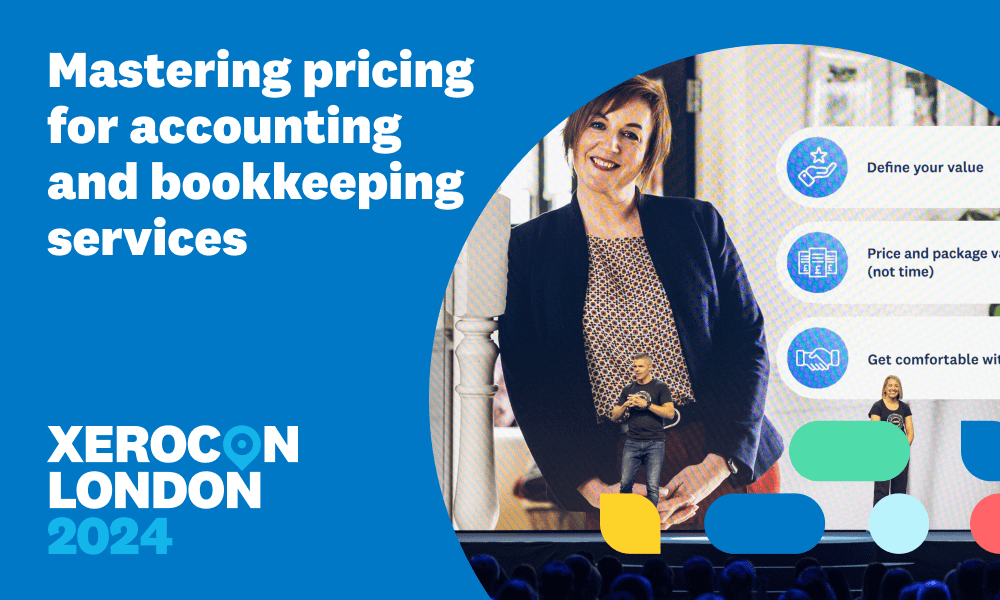
Mastering pricing and packaging for accounting and bookkeeping services


As a business owner, would you be happy or sad if you got a hundred new clients tomorrow? Getting more business sounds exciting, but can be daunting if bookkeeping and accountancy practices aren’t set up to scale effectively.
There is a slow but steady shift towards value-based pricing, rather than traditional hourly billing. If you want to adopt a pricing model based on the value you offer and the outcomes you deliver, where do you start?
This topic was covered in one of the sessions at Xerocon London, where we discussed the three key areas you should understand to nail your value proposition.
Defining your value
What kind of accountant or bookkeeper do you want to be? Would you focus on compliance, advisory, or both? Understanding what you want is essential. Equally important is to consider the clients who resonate with your value. Not all small businesses require the same. Some want tax guidance; others need business planning. It’s about discovering what you want to be doing and doing it very well. Communicate your value clearly and do the work you love to also achieve your own quality of life. Your happiness will positively affect your business relationships.
Be open to collaborate and connect with other accountants and bookkeeping professionals, understand their skills and styles and don’t be afraid to refer clients to them, when appropriate. There’s enough work for everyone.
Pricing and packaging your value
Once you know your value and the kind of clients you’ll want to work with, it’s time to turn this into something you can bill clients for. This is where value-based pricing can be more effective than hourly billing — it shifts your clients’ mindset to focus on the outcomes you can achieve for them, ensuring you’re both working towards the same goals.
Small businesses need a hierarchy of services similar to Maslow’s ‘hierarchy of needs’, with compliance at the bottom and advisory services at the top. Small businesses often don’t know what services they need – or what accountants and bookkeepers can do for them – so it’s crucial to clearly lay out and guide them through your offerings by creating a clear hierarchy or menu of services.
At a recent roundtable with accountants, bookkeepers, small businesses, and other industry stakeholders, we developed a Small business hierarchy of needs toolkit to help you understand this hierarchy. This toolkit outlines various ways business advisors can support small businesses:
- Getting the basics in place, including tax affairs and financial compliance.
- Identify key business drivers and guide clients in maximising their potential through effective use of financial systems.
- Streamline performance and assist clients in planning for the future, shaping their businesses for optimal success.
Automation tools like Xero’s upcoming AI business companion, Just Ask Xero (JAX), highlight the importance of understanding your added value beyond tasks that can be automated. Technology is a catalyst for innovation but more than ever, it’s important you leverage automation and AI while demonstrating your value. Clients pay for human connection and expertise, not just tasks. Automation can’t underpin everything on that hierarchy of needs, but as tasks become automated, you must find a way to maintain and enhance your unique value.
Accountants and bookkeepers are in high demand. If you have limited availability, don’t hesitate to turn down clients who don’t value your services or if you’re too busy to accommodate them. Remember to apply your expertise in forecasting to your own practice. Don’t be afraid to raise prices to ensure competitiveness and a fulfilling career. Sacrificing work-life balance for the sake of being the cheapest option isn’t worthwhile.
Getting comfortable with selling
Becoming comfortable as a salesperson is facilitated by understanding your value. Building relationships and emphasising human connection is key to selling effectively. Advisors often struggle with pricing and selling because they fail to acknowledge their expertise and communicate their value confidently. Transitioning from a technical accountant to a business owner involves a mindset shift rather than just learning new skills.
Selling isn’t just getting a client over the line on the engagement letter. Your pricing should be reviewed on a regular basis and it should all be clearly communicated in the contract to avoid scope creep and ensure fair compensation.
A useful tip would be to look at your engagement letters and ‘sales’ process. Are they easy to understand? Do you have different types depending on the level of service they’re looking for in the hierarchy? How are you asking your clients to pay? For example, are you collecting via direct debit and automating your invoices in Xero Practice Manager so you don’t have to chase them?
Knowing your value lets you focus on the bigger picture and achieve goals beyond just being busy. As new tools transform practices, having a scalable model with the right pricing and packaging is crucial. Define your value, price it appropriately, and sell it confidently.
Share this article
[addtoany]